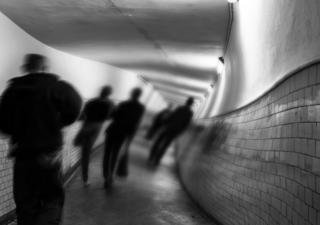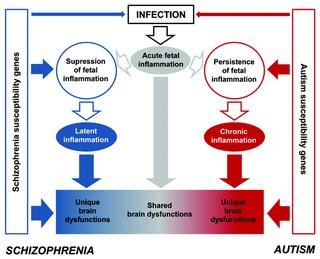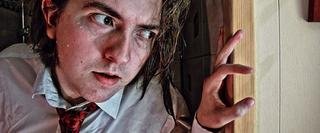Schizophrenia: Undertsanding the Madness, Ailment and Disorder

In layman's terms, Schizophrenia is a disorder which affects how a person thinks, feels and acts. A person suffering from Schizophrenia may have difficulty distinguishing between what is real and that which was made up by their mind (Imaginary), thereby having difficulties in relating with their real environment.
A person suffering from Schizophrenia may have difficulty distinguishing between what is real and that Schizophrenia doesn't lead to split personality or multiple personality, but it is related to a condition known as Schizoaffective disorder that includes both schizophrenia and mood disorder (exists in form of bipolar disorder or depressive disorder)
Origin and History
According to Medical history the term "dementia praecox" was used to describe a mental illness first identified by Dr. Emile Kraepelin in 1887, though the health condition is generally believed to have been with humans throughout history: the disease is as old as mankind.
Writings from ancient Egypt give information about a disorder with symptoms that are almost accurately comparable with those of the present day Schizophrenia, while the Greek and Roman never had anything of such, though they had other mental related cases documented.
Schizophrenia was first termed "dementia praecox" by Dr. Kraepelin in his attempt to differentiate the several mental conditions humans suffer from, against the general assumption that every psychotic disorder is madness.
The term Schizophrenia was coined by Swiss psychiatrist, Eugen Bleuler in 1911. He was the first to describe the symptoms as positive or negative.
The word "Schizophrenia" was coined from the Greek root words "schizo" which means "split" and "phrene" which means "mind", to describe the fragmented or disjointed thinking pattern of people with the disorder. He used the term to try disprove the idea of split or multiple personality of the condition demetia praecox as named by Dr. Kraepelin against the common misunderstanding by the public.

Categories of Schizophrenia
Bleuler and Kraeplin were able to subdivide schizophrenia into categories, based on the prominence of symptoms and prognoses, they were able to come up with disorganized, catatonic and paranoid schizophrenia, but over time scientists were able to further categorize the condition into residual and undifferentiated schizophrenia. Making a total of 5 types or category of schizophrenia.
Researchers do not only depend on this classification as they are not totally applicable to every patient, therefore they came up further sub-divisions based on the preponderance of the "positive" vs "negative" symptoms as invented by Bleuler, the progression of the disorder in terms of type and severity of symptoms over time, the co-occurrence of other mental disorders and syndromes.
Differentiating types of schizophrenia based on clinical symptoms is an attempt to figure out the different causes of the disorder.
Causes of Schizophrenia and trigger agents

Though the exact cause(s) of schizophrenia still remains unclear, scientists have been able to develop some theories about the possible cause of the disorder, which include:
Genetic (Heredity):
Scientists believe that the disorder sometimes run in families, despite the fact that there are individuals who suffer the disorder but do not have any history of the disorder in their family. It is scientifically believed that many different genes may increase the risk of the disorder, but a single gene cannot cause the disorder on its own, it evolves from negative interaction of genes.
Though it is not yet possible to use genetic information to prove or predict that an individual will suffer the disorder later in life or not, scientists think that interaction between genes and aspects of an individual's environment are very important in the development of the disorder.
Such environment factors may include:
• Psycho social factors
• Malnutrition before birth
• Complications during birth
• Exposure to viral activities
Brain chemistry, structure and function:
Scientists believe that people with the disorder have an imbalance of brain chemicals or neurotransmitters (dopamine, glutamate and serotonin). The normal work of these neurotransmitter is to allow nerve cells in the brain send messages to each other thereby controlling ones reactions to stimuli, but the imbalance of these chemicals affects the way a person's brain would react to stimuli, which gives a logic reason to why a person with the disorder would have an imbalanced reaction to sensory information which other people would handle better. The difficulty the brain goes through in the processing of sounds, smells, sights, tastes and memory in the case of a person suffering from schizophrenia can also lead to hallucinations or delusions.
Some researchers suggest that complications during the development of the brain of the fetus in the womb could cause problems with connection of brain pathways which later leads to schizophrenia
Infections:
The disorder is believed to be possibly triggered by environmental related effects such as viral infections or immune disorders

Phases and Symptoms
Symptoms of Schizophrenia usually start between ages 16 and 30. In very rare cases, children also suffer Schizophrenia
The symptoms fall into 3 categories ( Cognitive, Negative and Positive), while their 3 known phases or stages to the disorder
(Prodromal phase, active phase and residual phase)
Predromal Schizophrenia
The first of the 3 phases, this marks the beginning of the disorder, it describes when the schizophrenic changes begin to occur in an individual until they develop mature psychosis: it is the stage that the person goes through before the condition now becomes obvious to people around them.
This stage of the disorder is very important because, if it is recognized early and treated the individual may not have to suffer the other stages.
Active Schizophrenia
The active and residual phases are the phases commonly termed as mental illness by other people observing the persons.
This stage is also known as the acute phase and it is characterized by most of the known symptoms: hallucinations, paranoid delusions, and disorganized speech and behaviors.In this phase, the patient appears obviously psychotic and if not treated may continue for weeks, months even years until the patient is subjected to acute care and treatment.
Residual Schizophrenia
This stage has the characteristics of the prodrome phase: obvious psychosis will subside, but the patient may still exhibit some negative symptoms, such as social withdrawal, lack of emotions, and low energy levels. Though psychotic behaviors and vocalizations have receded, the patient may still hold on to strange beliefs, at least for a while.
Contrary to popular belief, people with the disorder are not usually violent.
Some other symptoms include: difficulty in concentrating, uncoordinated movement like being jumpy or unnecessarily reserved.

Treatment
There is no yet known cure for the condition, yet people with it can still live fulfilling and productive lives with the proper treatment. Recovery is possible through a variety of services, including rehabilitation programs and medication.
Medication
The medicine a patient would need depends on the symptoms they exhibit whether they have depressions or bipolar along with schizophrenia. The major prescription doctors give for psychotic symptoms such as those evident in schizophrenia are called anti-psychotics.
Psychotherapy
Also known as rehabilitation program helps the patient understand their condition and manage everyday challenges associated with the disorder. Such programs include:
Psycho-social Treatments: These treatments are helpful after patients and thier doctor have found a medication that is good for the individual. This method involves the use of coping skills to address everyday challenges that comes with the condition, this treatment may employ the use of trial and error at first, but once a stable system is found patients usually respond quick and well.
Coordinated Special Care (C.S.C)
This treatment integrates medication, psycho-social therapies, family involvement, supported education, employment services and case management, all aimed at keeping the the patient's mind busy and active, thereby reducing symptoms and improving quality of life.
Nice article on Schizophrenia!!!
thank you
I think you accidentally posted this article multiple times?
yes, I had problems while posting it